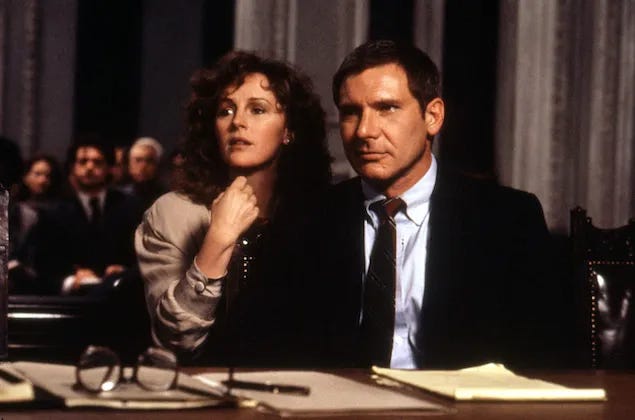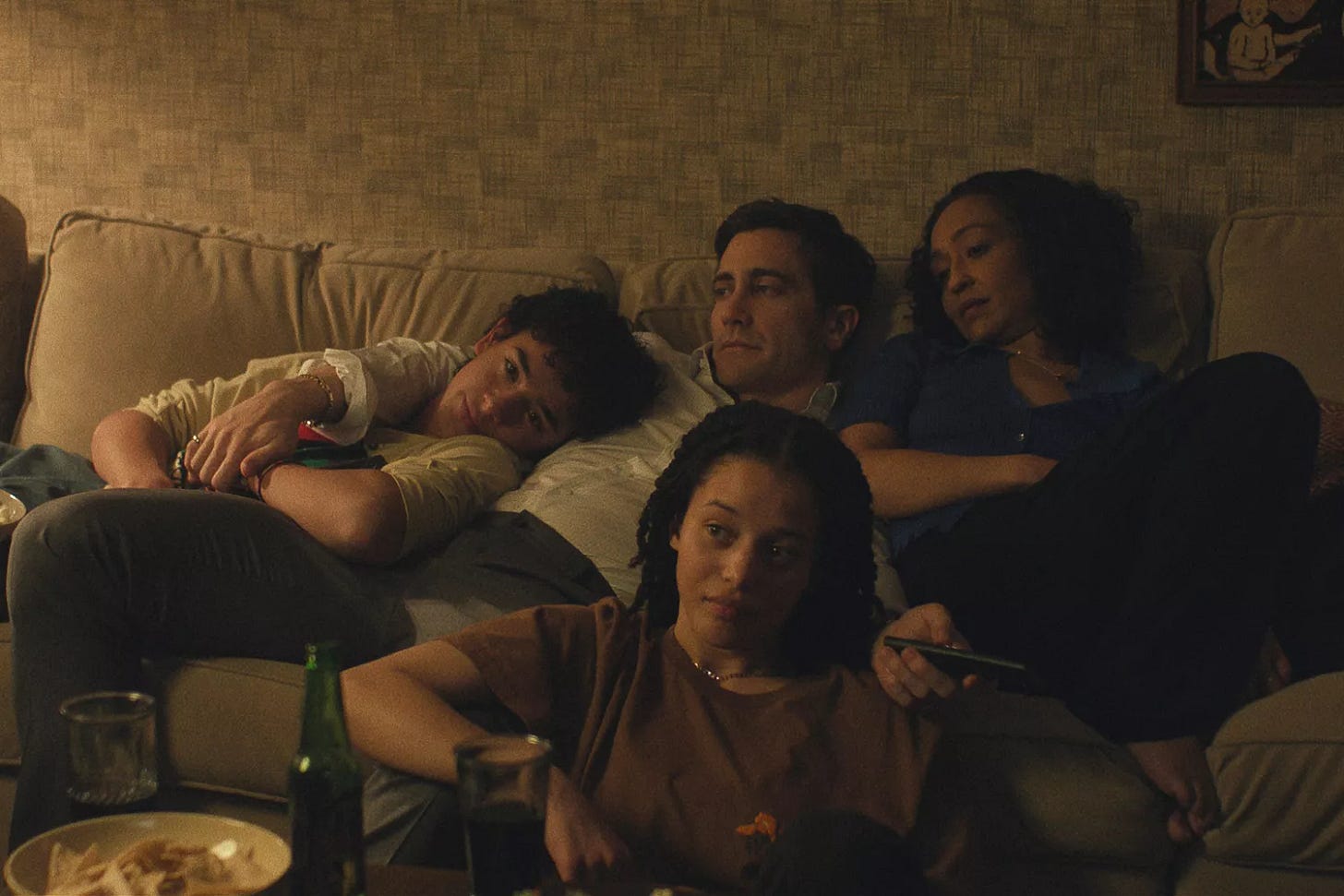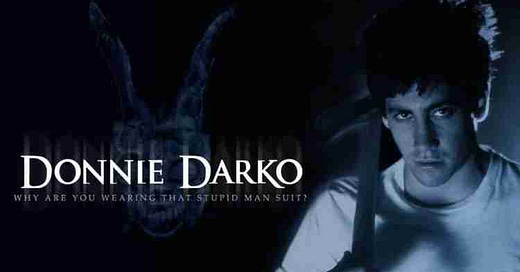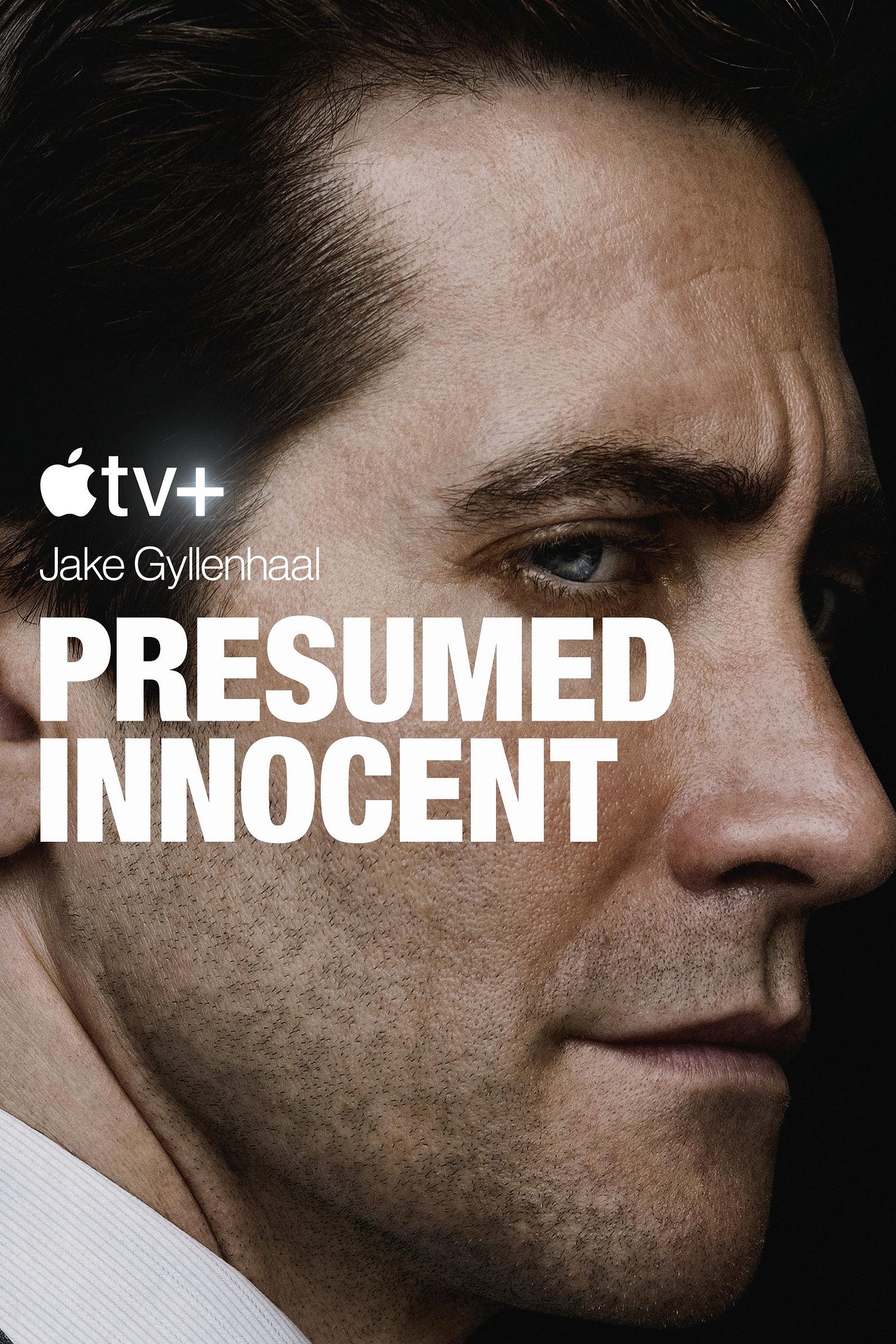Apple TV’s most-watched drama ever (what?) is either a dully conventional courtroom drama or a smartly adapted series that successfully refreshes Scott Turow’s 1980s plot and characters. What do we think, people?
I think we need to talk about Rusty, first.
He’s a confirmed philanderer, having had at least one torrid affair with a co-worker—all the more galling considering we, as viewers, are well aware Rusty has a sweet family, including a seemingly devoted wife and, in the Apple version, two smart and caring adolescent children.
There’s also the possibility he’s a murderer. That’s not a spoiler! I mean, come on! The show is called “Presumed Innocent.” Presumed.
Or maybe that’s just how a reader/viewer from 2024 would see it. When the original movie starring a young, handsome Harrison Ford—based on the 1987 debut bestseller by Scott Turow—premiered in 1990, Roger Ebert said this:
"Presumed Innocent" has at its core one of the most fundamental fears of civilized man: the fear of being found guilty of a crime one did not commit. That fear is at the heart of more than half of Hitchcock's films, and it is one reason they work for all kinds of audiences. Everybody knows that fear.
An excellent point. And yet: has the world changed, or is it just me? Now when I watch/read, I assume that everyone is potentially guilty, especially the least likely suspect, and especially especially the main POV character because that’s even more fun to pull off—in this case, a character who is endlessly praised for his idealism and seems determined to solve the case.
Innocent or guilty, we have to “like”1 him even if he is—best-case scenario—merely a disloyal husband and father. How do the various versions of the story pull this off?
If you’re going to say the latest adaptation pulls it off by hiring Jake Gyllenhaal of the expressive eyes and the ridiculous six-pack abs—welllll, sure, an actor’s charisma can help, but Jake has played plenty of unlikable creeps in his career.
My personal thesis is that the latest writers and director had a higher bar to clear—and not only because we’ll spend many more hours with Rusty in an eight-episode series than we would have in a conventional movie. I think we’re more tired of philandering men now than in 1990, especially men who are stupid and inappropriate enough to have a messy interoffice romance.
If the guy wears a suit and commutes to an important job in the big city while his wife waits back at home, tending the kiddos, I’m even more tired of him. He was just so obsessed with the blonde at work! He couldn’t help himself! All the other guys in the office were doing it! Help.
Should I even watch this TV series? That’s what I was thinking. But stick with me here.
For the purpose of craft and culture study, let’s compare how we first meet Rusty in all three story versions.
Following a prologue in which we hear Rusty give an opening statement about the legal process—establishing the importance of both truth and justice, the source material opens this way…
TUROW’S CITY OF BIG SHOULDERS
Turow’s novel opens with the lawyers and politicians heading to the funeral for murdered lawyer colleague Carolyn Polhemus. There’s a lot of traffic—Chicago! I don’t miss you!—which provides ample time for exposition. We don’t yet know Rusty had an affair with her. We hear D.A. Horgan, Rusty’s boss, talking first, worrying more about his re-election campaign to Nico Della Guardia than the death of Carolyn. Raymond gives Rusty the initial case details. She was found raped and bound. No forced entry.
The chapter continues with several more paragraphs about the campaign, followed by backstory on Rusty’s sad, impoverished childhood. Finally we get to the funeral. The narrator makes it clear that Carolyn “got around.” (Sigh.)
More politics; more press; a mayor and judges; we’re still at the funeral and it seems more of a networking event for the guys than a memorial. A ton of backstory on Nico Della Guardia. And finally, a ball-busting exchange (sorry, this is what an ‘80s novel does to you) with Nico Della Guardia, who tells Rusty he could have been the one with a political career, running for DA.
(Nico says):
“You’d have been tough, very tough.”
“Ridiculous,” I say, manfully pretending that like scenarios have not described themselves to my imagination on a hundred occasions in the last year.
WHOA that’s a lot of politics and careerist posturing up-front! As a teen who grew up just outside Chicago and felt older than my years when I read Turow’s novel, I don’t remember minding it one bit. It captured life in the padded-shouldered, hypercapitalist city. I liked Turow clueing us into the fact that Rusty was an ambitious schemer and dreamer. What Chicago lawyer or businessman wasn’t?
NOW, as a woman, writer, and editor living in the 2020s, I think, “Maybe we should get more of a sense in the early pages that Rusty cares that Carolyn is dead?
Is Rusty feeling a little choked up, maybe? Because he gives no clue that he’s bothered until someone points out that Carolyn’s son is at the funeral. He didn’t know she had a son. This produces the first shock, which seems more about what he didn’t know than about what happened, i.e., her grisly murder. (Which only makes me think he is a guy who prizes being in control.)
Finally, a few pages later, we get a subtle, stifled upwelling of his sorrow—but on my Kindle, this is 30 pages into chapter 1. It’s about time.
But again: in the 1980s I did not question this.
THE MOVIE ADAPTATION: A FAMILY MAN SCREWS UP

You’re a movie maker in the late ‘80s, aware—perhaps more than Turow was—that you’ve got some people to win over, and not all of them give a crap about Chicago politics, although they certainly love a morality tale that shows what happens to married men who f*** around! (See, Fatal Attraction, 1987.)
So, do you introduce Harrison Ford to the viewer on the way to the funeral?
No. You introduce him during a peaceful, status quo orange juice moment, at home, eating breakfast with his wife and 11-year-old kid. All three family members are relaxed, making jokes. The kid actor isn’t terrible, and the wife, although poofy-haired and somewhat passive, seems to have a sharp mind. They drive the kid to school, together. When they drop him off and he says he has a game and won’t be home until late, the parents joke, like father, like son.
Aside from the funeral scene—where this version of Rusty is less focused on ambition—we see a lot of sleuthing early enough to be persuaded that Rusty really does want to get to the bottom of things. Early on, he even digs into a bribery subplot that isn’t hashed out early in the TV version.
Back home, we discover that Rusty’s wife is on year ten of writing her math dissertation, which makes her woeful. But unlike other men in the movie, who all seem to insist on calling women “broads,” Rusty praises his wife’s brains and seems supportive of her. Aside from the cheating and working late all the time, that is.
THE 2024 APPLE TV VERSION: A GOOD IF DEEPLY FLAWED FATHER
Imagine you’re the writer tasked with introducing Rusty in this latest version. Nix to the insensitive funeral politicking. Nix, also, to the man sitting at breakfast while his homemaker wife directs the kitchen flow. What do you show us, instead?
The current writer(s) picked a home scene showing Rusty playing with his kids in the backyard pool. Our first impression is not of a man at work or on his way to work. He spends real time with his children, seems to adore them, and has earned their respect and loyalty in return. When he’s charged with murder, he chooses to be candid with both teens, telling them about his affair and updating them on uncomfortable case and trial details. If anything, he’s more forthright than we might expect a criminally charged, adulterous father to be.
The TV creators’ decision to make the kids teenagers is, in my mind, a brilliant change from the original. It increases the number of possible suspects (the son was seen biking close to the victim’s apartment; the savvy daughter can’t be excluded either) and allows for more meaningful family scenes. We are never going to give Rusty kudos for talking openly to his wife, who seems to be an inch away from leaving him. But to his children? Absolutely.
(The new show also allows wife Barbara, played by Ruth Negga, to have a fuller life and more complexity, but that’s another topic.)

Of course, family dynamics aren’t the only window into Rusty’s soul. In early episodes, we see him investigating with determination. He is active. He is competent. He seems to have integrity. He’s not a jerk to most of his colleagues, except for the slimier ones. We’re clued into the fact that he and Carolyn Polhemus were the idealists in the office. Yes, he may have a slight temper in justifiable situations and an obsessive streak that keeps open the possibility of guilt—barely. I’m not as convinced a man is unhinged just because he texts his lover excessively. Who doesn’t text excessively these days? But that’s fine. I don’t want to distrust Rusty!
LOVE IT? HATE IT? WILLING TO LEARN FROM IT?
I watched all episodes to date before I googled reviews, and I’m frankly puzzled by its mixed reception. The Guardian called it “soullessly slick.” Time Magazine called it “sluggish” and described Gyllenhaal’s performance as “perplexingly flat.”
Personally, as much as I thought the casting and acting are both top-notch, I can name lots of shows with more distinctive characters and a much twistier plot—”Mare of Easttown” comes to mind.
But was I eagerly waiting for each episode to drop? Absolutely. As were countless other viewers—enough to prompt Apple to announce there will be a Season 2.
Clearly, the average viewer is okay with Jake G’s supposed flatness. Maybe the viewer understands, as some of the critics do not, that Jake/Rusty has to be enigmatic.
Variety put it this way: “Presumed Innocent” soars because the audience is never quite sure what to make of Rusty. He is highly affable one moment and borderline narcissistic the next, leaving both his sincerity and his innocence perpetually up for debate.
For readers/viewers, the show is a conventional but riveting courtroom drama with a great cast and above-par cinematography.
For writers, I’d argue, it’s a lesson in how to develop characters in a way that holds open lots of “whodunnit” possibilities. But even more intriguing: it’s a master class in showing us how serial adaptations must evolve to keep pace with changing audience expectations.
A little less sexism. More candor. Better parenting. And an ‘80s plot can still work.
Are you watching? What do you think? Please let us know!
“Like” : By which I mean, not “I want to be his friend” but “I am willing to engage with him” and often “I care about—or at least am intensely curious about—what happens to him.”







I disagree. Yes, I'm watching, but only to see how far they can push a two-hour movie into 8 tedious hours. The scenes at night at home are so dark I can barely see what's happening; Rusty and Barbara have zero chemistry - how did these two ever wind up together? Bill Camp is a highlight as is Molto but it's plodding, slow, and over the top, IMHO. Season Two? please don't tell me they are going to end on a "to be continued". My guess is on the son which might lead to Season Two but otherwise? I'm out
oh I LOVE this piece and how you break down the differences in approach to what is essentially the same story. Me and my husband are obsessed with the show we watched the entire thing (that has been released) this week. I love watching Gyllenhaal put on that mask and hide whatever sinister shit is lurking beneath his handsome face. There is so much terror in thinking how you are one "wrong place wrong time" away from being sent to jail....